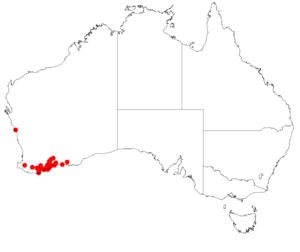Calectasia gracilis facts for kids
Quick facts for kids Calectasia gracilis |
|
|---|---|
| Scientific classification |
|
| Kingdom: | Plantae |
| Clade: | Tracheophytes |
| Clade: | Angiosperms |
| Clade: | Monocots |
| Clade: | Commelinids |
| Order: | Arecales |
| Family: | Dasypogonaceae |
| Genus: | Calectasia |
| Species: |
C. gracilis
|
| Binomial name | |
| Calectasia gracilis Keighery
|
|
 |
|
| Occurrence data from AVH | |
| Script error: The function "autoWithCaption" does not exist. | |
Script error: No such module "Check for conflicting parameters".
Calectasia gracilis, often called the blue tinsel lily, is a special plant. It belongs to the Dasypogonaceae family. You can only find it in the southwestern part of Western Australia. This plant is a woody perennial herb. This means it lives for many years. It grows in a spreading, tufted shape. Its flowers have bright blue petals. In the center are six yellow stamens. These stamens turn orange-red as they get older. The blue tinsel lily looks a lot like other plants in the Calectasia group. Scientists officially recognized it as a unique species in 2001.
Contents
What Does the Blue Tinsel Lily Look Like?
The blue tinsel lily is a small plant. It grows to be about 20–45 cm (8–20 in) tall. It has special roots that help it stand up. Its leaves are smooth and don't have hairs. They are about 5.4–7.2 mm (0.2–0.3 in) long. Each leaf has a short, sharp point at the end.
The base of the flower's petals forms a tube. This tube is about 5.7–6.9 mm (0.2–0.3 in) long. The petal parts themselves are about 8–9.5 mm (0.3–0.4 in) long. They are also about 2–3 mm (0.08–0.1 in) wide. Together, they create a blue, papery star shape. This star fades to a pale blue as the flower ages. In the middle of the star are six yellow stamens. These are the parts that make pollen. They change to an orange-red color over time. The style is another part of the flower. It is about 6.2–7.2 mm (0.2–0.3 in) long. It sticks out past the stamens. You can see these beautiful flowers from August to October.
How the Blue Tinsel Lily Got Its Name
Calectasia gracilis is one of eleven different species in the Calectasia group. Gregory John Keighery first officially described this plant in 2001. He used a sample collected near Cape Riche. This sample was found by Russell Barrett and Kingsley Dixon. The second part of its scientific name, gracilis, comes from a Latin word. Gracilis means "slender" or "thin."
Where the Blue Tinsel Lily Grows
This type of blue tinsel lily grows in a specific area. You can find it from Albany and Stirling Range National Park all the way east to Hopetoun. It is spread out in several national parks. These include the Stirling Range, Fitzgerald River, and Frank Hann. It likes to grow in sandy soil made of quartzite. You can often find it in mallee woodland or heath areas. These places often have laterite or granite rock underneath.
Protecting the Blue Tinsel Lily
The blue tinsel lily, Calectasia gracilis, is not very common. However, it is found in many different places. The Western Australian Government's Department of Parks and Wildlife has looked at its status. They have classified it as "not threatened." This means it is not currently in danger of disappearing.

